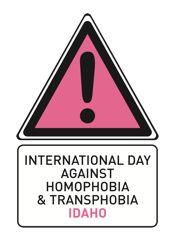 Taken from the 2013 IDAHO committee brochure:
Taken from the 2013 IDAHO committee brochure:
In almost 80 countries around the world, loving someone of the same sex is still considered illegal, at times involving lifetime imprisonment and, in nine countries, it is even punishable by death!
And in many more countries still, citizens are denied their right to live according to their preferred gender identity.
As well as legal discriminations, social homophobia and transphobia serve to daily deny millions of people across the world their basic human dignity.
The International Day Against Homophobia and Transphobia (IDAHO) was created in 2004 to draw the attention of policymakers, opinion leaders, social movements, the public and the media to this issue.
It is not one centralised campaign; rather it is a moment that everyone can take advantage of to take action.
The date of May 17th was specifically chosen to commemorate the World Health Organization’s decision in 1990 to declassify homosexuality as a mental disorder.
The International Day against Homophobia and Transphobia is now celebrated in more than 100 countries, in all world regions and in places as diverse as Australia, Iran, Cameroon or Albania.
It has received official recognition from several States and such international institutions as the European Parliament, and by countless local authorities. Most United Nations agencies also mark the Day with specific events.
LGBTI organizations, governments, cities, human rights organizations, corporations and celebrities have all taken action on May 17th to:
- Draw media attention to the issue of homophobia and transphobia
- Organise events which mobilise public opinion
- Demand attention from policymakers and engage in lobbying activities
- Network with like-minded organisations and develop new partnerships, at home and beyond
- Mobilise existing constituencies and address new audiences
The IDAHO Committee was set up by the founders of the International Day Against Homophobia and Transphobia.
Our objective is to make the International Day Against Homophobia and Transphobia a moment of global awareness and mobilization that serves as a useful space for activists to act at all levels.
We act all year round to:
- Make the Day known and to encourage activities at all levels
- Increase its political weight and its capacity to attract policy and media attention
- Promote the official recognition the Day receives from official stakeholders
- Highlight the scope and the diversity of the mobilisation on the Day
We support local organisations to develop strategies in advocacy, awareness-raising and public campaigning around the Day.
We use the media and policy attention the Day receives to:
- Promote messages against homophobia and transpobia through such public campaigning activities as video projects and collaboration with artists…
- Develop international campaigning initiatives around specific themes
